Britain’s Portable Antiquities Scheme (PAS) has reached a milestone in a most dramatic fashion: its one millionth recorded find is a 4th century Roman coin proved to be the first in a hoard of 22,000 coins. It was found on November 16th of last year by semi-retired builder and metal detector hobbyist Laurence Egerton on the Clinton Devon Estates, near Seaton Down, Devon. He found the first two coins just under the surface, then dug deeper. His shovel came up overflowing with similar coins.
Here’s video his wife shot of his discovery:
Egerton alerted the Devon PAS Finds Liaison Officer and the county archaeologist. He was told to remove all the loose objects and refill the hole while the Devon County Council arranged a professional excavation. Just to be sure nobody else interfered with the hoard, Egerton slept in his car next to it for three nights. Between November 18th and 22nd, contract archaeologists excavated an area of three square meters around the find spot.
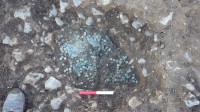 They found thousands of coins stuck together in one main group in a small pit. There are two concreted lumps within the main group which may indicate several deposits were made over time. The lozenge shape of the main deposit suggests they were buried in something flexible like a bag rather than, say, a chest. Underneath the coins fragments of what may be a fabric of some kind were recovered. They’ll be tested to determine whether they could be the remains of the bag that once held the coins.
They found thousands of coins stuck together in one main group in a small pit. There are two concreted lumps within the main group which may indicate several deposits were made over time. The lozenge shape of the main deposit suggests they were buried in something flexible like a bag rather than, say, a chest. Underneath the coins fragments of what may be a fabric of some kind were recovered. They’ll be tested to determine whether they could be the remains of the bag that once held the coins.
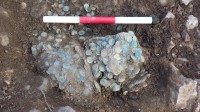 The Seaton Down Hoard was transferred to the British Museum where the coins were lightly cleaned so they could be valued in compliance with the Treasure Act. The total weight of the coins is 68 kg (150 pounds). They range in date from the 260s A.D. to the 340s with 99% of them struck between 330 and 341 A.D. in the reigns of Constantine and his sons Constantine II, Constantius II and Constans. The most recent coins date to 347-8 A.D. from the joint reign of Constantius II and Constans, the latter of whom was the last legitimate Roman emperor to visit Britain in 343 A.D.
The Seaton Down Hoard was transferred to the British Museum where the coins were lightly cleaned so they could be valued in compliance with the Treasure Act. The total weight of the coins is 68 kg (150 pounds). They range in date from the 260s A.D. to the 340s with 99% of them struck between 330 and 341 A.D. in the reigns of Constantine and his sons Constantine II, Constantius II and Constans. The most recent coins date to 347-8 A.D. from the joint reign of Constantius II and Constans, the latter of whom was the last legitimate Roman emperor to visit Britain in 343 A.D.
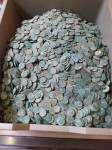 Almost all of the coins are a very common type known as a nummus made of copper-alloy with a small amount of silver. (The handful of 3rd century coins are radiates.) Most of them, more than 11,000, were struck at the mint in Augusta Treverorum (Trier), with 3500 struck in Lugdunum (Lyon) and 2000 at Arelate (Arles). In total an impressive 17 mints are represented in the hoard, and there are some ancient forgeries of indeterminate origin too.
Almost all of the coins are a very common type known as a nummus made of copper-alloy with a small amount of silver. (The handful of 3rd century coins are radiates.) Most of them, more than 11,000, were struck at the mint in Augusta Treverorum (Trier), with 3500 struck in Lugdunum (Lyon) and 2000 at Arelate (Arles). In total an impressive 17 mints are represented in the hoard, and there are some ancient forgeries of indeterminate origin too.
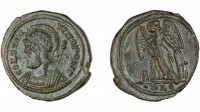 The millionth PAS find, the first coin Egerton unearthed, is a nummus struck in 332 A.D. at the Lyon mint to celebrate Constantine’s founding of the new imperial capital of Constantinople. The obverse of the coin features a personification of Constantinopolis, a laureate and helmeted bust with a scepter over the left shoulder; the reverse depicts winged Victory standing on ship’s prow, holding a scepter of spear in front of her and a shield behind.
The millionth PAS find, the first coin Egerton unearthed, is a nummus struck in 332 A.D. at the Lyon mint to celebrate Constantine’s founding of the new imperial capital of Constantinople. The obverse of the coin features a personification of Constantinopolis, a laureate and helmeted bust with a scepter over the left shoulder; the reverse depicts winged Victory standing on ship’s prow, holding a scepter of spear in front of her and a shield behind.
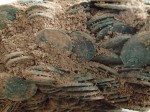 Coin hoards from the reigns of Constantine and his sons are among the most commonly found in Britain, but Seaton Down is notable both for its large size (the fifth largest ever found in Britain) and because it was excavated and recorded by archaeologists. All the other big Constantinian hoards, like the one of 22,670 coins unearthed at Nether Compton, Dorset, in 1989, were never recorded, analyzed or studied before being returned to the finder who broke up the collection and sold the coins piecemeal. Copper coins weren’t considered Treasure Trove by the laws at that time, and the local museum that kept the hoard until it was returned to finder just didn’t have the resources to study it properly.
Coin hoards from the reigns of Constantine and his sons are among the most commonly found in Britain, but Seaton Down is notable both for its large size (the fifth largest ever found in Britain) and because it was excavated and recorded by archaeologists. All the other big Constantinian hoards, like the one of 22,670 coins unearthed at Nether Compton, Dorset, in 1989, were never recorded, analyzed or studied before being returned to the finder who broke up the collection and sold the coins piecemeal. Copper coins weren’t considered Treasure Trove by the laws at that time, and the local museum that kept the hoard until it was returned to finder just didn’t have the resources to study it properly.
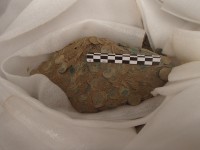 The Portable Antiquities Scheme was founded in 1997 to help prevent that kind of loss to the nation’s scholarship cultural heritage. In this case it has functioned as planned, giving archaeologists the opportunity to remove the coins in solid blocks so that even tiny fragments can be analyzed for key information by an institution (the British Museum) that has the technology, expertise and funding to thoroughly study and document the find.
The Portable Antiquities Scheme was founded in 1997 to help prevent that kind of loss to the nation’s scholarship cultural heritage. In this case it has functioned as planned, giving archaeologists the opportunity to remove the coins in solid blocks so that even tiny fragments can be analyzed for key information by an institution (the British Museum) that has the technology, expertise and funding to thoroughly study and document the find.
The hoard was officially declared treasure this month. Next on the schedule for the Seaton Down Hoard is for its market value to be determined by the Valuation Committee. The Royal Albert Memorial Museum & Art Gallery in Exeter, the museum in Devon closest to the find, wants to get a jump on the process. They’ve launched a fundraising campaign so they’ll have the money to pay the finder and landowner the amount of the valuation and keep the hoard together in the county where it was discovered. You can donate online here.
I didn’t know Duck Dynasty had an archaeology division.
I just have to say once again. I absolutely love the way the British Government works with the finders and land owner with respect to these finds. From what I can read, they seem very fair, and have an honest desire only to increase the knowledge, understanding, and history of their people and country.
I am not sure what America’s “pathway to reciprocations” is, for those who would find something like this, but again, from my point of view, having lived here for awhile, I can only think the pathway would be paved with the self interested. Not with those caring either for the finders of the betterment of in an understanding of the Country they live in.
Thank you for reading.
-Tom
what would happen in America if you found a hoard of artifacts? The federal government would find some obscure regulation in the CFR with a criminal element and prosecute you, and ultimately, throw you in a minimum security federal prison. there’s a code in America making us all felons on a daily basis. this is America, we love to throw people in jail!
secondly, burying money in the ground was the safest place to keep money in those days. sadly, the money often outlasted the owners….
today the government encourages us to put our money in the bank. that way, it can be charged fees, confiscated and taxed! put this much money in Citibank for 100 years and you’ll have nothing left but overdrafts, late fees and collections letters!
Haha, I appreciate the brevity. Either you have experienced this experience first hand, or you have been on a healthy diet of anti government cynicism for the last while. Either way, it made for what feels to be an accurate portrayal of what it would be like to find 22,000, lets say, (mostly based on this hoards rarity and age of coin), a mix of mid 1800’s gold and silver pieces. I do believe I know America and its people well enough to say that the minute the announcement were made, if it were ever made at all, (some people here are still smart), that a pack of vultures, wolves and serpents would be on scene within minutes, each one having a lawyer and lawsuit in hand. And if the previously fortunate soul whole found the coins, had a cent left after 7 years of fighting to keep it, I would be absolutely surprised.
I tell my wife every night before bed that I wish our great grandparents had never left Britton. That was one big mistake that it is now impossible to undo. I wish Britton had a repatriation act for poor guys like me and my family, whereby we, the offspring of those souls who, whether when leaving Great Britton so long ago thought that they, and their children, would still be British citizens, or for those who gave no thought to their posterity to follow, and how it would effect them to be cut off from over one thousand years of personal history and tradition.
My goodness, I went on. I am sorry, but there is not a day that goes by that I am not painfully aware that my children will grow up in a country where the only thread that binds all its people together is not a history rich in learning and experience, but solely the love of money, and the perfection of methods to get it.
If this last bit is not welcome on your blog, I fully understand, and you are more than free to take it off. Regardless, thank you for allowing me to express an issue on your site that has both been exciting to think about, and painful to think of ways to attain, only to be pushed back.
-Tom